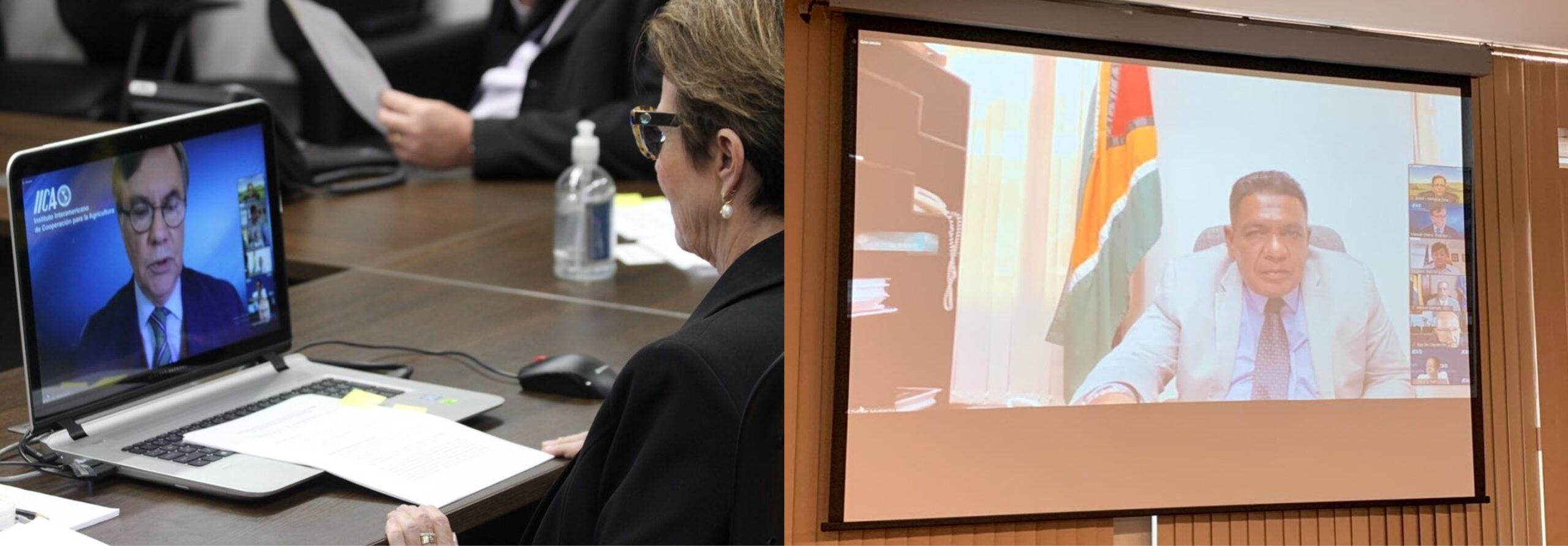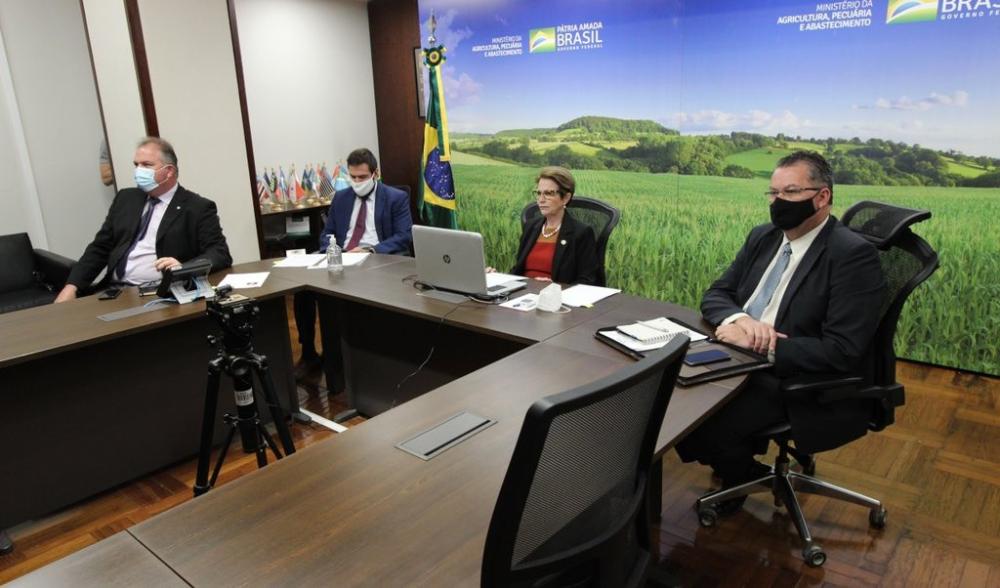Tereza Cristina, Minister of Agriculture, Livestock and Food Supply of Brazil, and Zulfikar Mustapha, Minister of Agriculture of Guyana, met to set in motion an extensive cooperation agenda. Manuel Otero, Director General of IICA, also took part in the meeting.

San Jose, 14 May 2021 (IICA). Tereza Cristina, Minister of Agriculture, Livestock and Food Supply of Brazil, and Zulfikar Mustapha, Minister of Agriculture of Guyana, held a meeting to promote bilateral trade and the production of food in Guyana to supply the Caribbean. Manuel Otero, Director General of the Inter-American Institute for Cooperation on Agriculture (IICA), also took part in the meeting.
Brazil and Guyana also aspire to strengthen an extensive cooperation agenda in several areas, including trade, infrastructure, animal health, and technology transfer. Following this first encounter facilitated by IICA, it is expected that the ministers accelerate negotiations with an in-person meeting likely to be held in August, as proposed by Minister Tereza Cristina.
“The agenda includes the possibility of cooperation in the areas of agricultural defense, technical assistance, research, and family agriculture initiatives”, stated the Brazilian minister after the meeting.
Meanwhile, Minister Mustapha expressed an interest in increasing the annual quota of 10,000 tons of rice exported to Brazil; in signing an agreement with Embrapa, the Brazilian Agricultural Research Corporation, for specialized training in biotechnology and agri-processing; and in receiving support for development projects in the cane sugar industry.
He also expressed that Guyana’s sea port could be a future alternative for the flow of Brazilian products to international markets.
“We want to transform our agricultural sector and we need the support of partners like IICA—for technical cooperation—and Brazil to achieve that transformation. I believe this will be the first of many meetings to set the foundation for cooperation”, expressed Mustapha. The Minister also informed that the Government of Guyana is holding meetings with potential Brazilian investors in the agriculture sector and others.
Manuel Otero, Director General of IICA, noted that “Brazil has become one of the planet’s most important countries in terms of agricultural production and trade, and Guyana is an important supplier of food, especially for the Caribbean, and could be for other markets as well”.
Mustapha pointed out that Guyana is the agricultural leader of the Caribbean Community (CARICOM) and a key country for regional food security.

“Our President, Mohamed Irfaan Ali, is leading a work group with several CARICOM ministers to implement the food security agenda in the Caribbean”, he stated.
Among the cooperation priorities with Guyana, Minister Tereza Cristina included the regional fight against the carambola fruit fly, deepening economic complementation agreements between the two countries, and issuing an international health certificate that would allow Brazil to resume meat exports to its neighbor to the north.
In terms of trade, in addition to importing rice, Brazil could import cashews, lemons, cassava, lemon juice, cashew juice, soybean, and peanuts from Guyana. Meanwhile, it could export soybean oil, sugar, chocolates, other candies, and pet food.
“At this meeting, IICA once again exercised its role as a bridge to bring countries together and contribute to building supranational public goods. The meeting resulted in a series of topics on which to build a binational cooperation agenda”, said Otero.
The Director General of IICA also underscored three aspects that unite Brazil and Guyana: “An extensive border spanning 1,600 kilometers; the fact that both countries, to scale, are agricultural powerhouses; and they share the Amazonian identity. IICA’s role is to transform this encounter, through its representatives, into a technical cooperation agenda for countries, institutions, and agriculture”.
Gabriel Delgado and Wilmot Garnett, IICA Representatives in Brazil and Guyana, respectively; Guy de Capdeville, Director of Research and Development at Embrapa; officials from different sectors of both countries; and diplomats also took part in the meeting.
More information:
IICA Institutional Communication Division
comunicacion.institucional@iica.int











